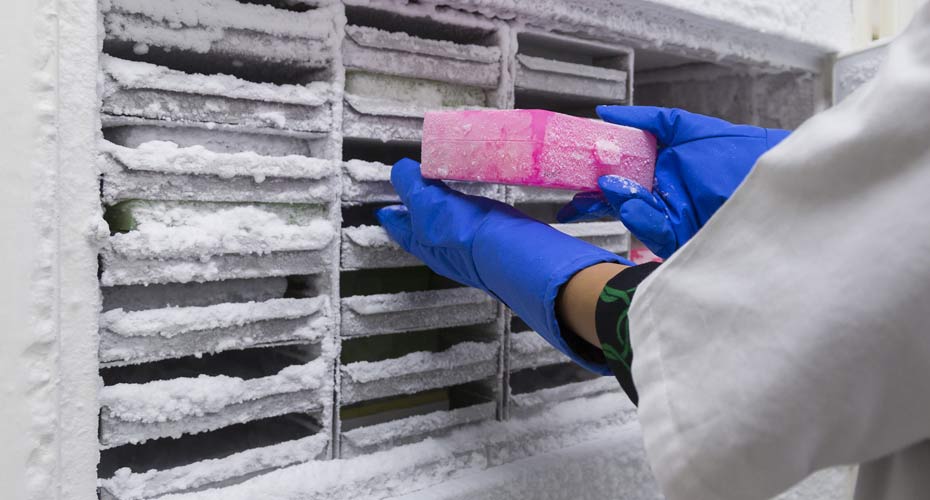ULT Freezers
Increase ULT freezer temperature to -70°C and save energy
Research laboratories are responsible for a significant share of the University of Exeter’s overall carbon emissions. Our green lab programmes focus on minimising these emissions and building sustainable labs that reduce our carbon footprint.
The use of Ultra-Low Temperature (ULT) Freezers is vital to our efforts. These freezers typically operate at -80°C. They can consume between 16 to 22 kWh of energy every day. In comparison, the average UK household consumes between 8 to 10 kWh daily.

See the Nature article on ULT energy use for further information.
Responsible cold storage management offers a solution to this problem. Proper maintenance and management of these freezers can reduce the amount of energy ULT freezers consume significantly.
At the University of Exeter, we encourage our lab users to manage all ULT freezers in an effective manner to:
- Lower energy consumption
- Increase freezer life
- Safeguard samples and other materials
Managing ultra-low temperature freezers to reduce energy waste is simple and effective. Here are some easy initiatives that our lab users adopt to minimise energy consumption:
- Increase ULT freezer temperature to 70°C - Increasing the temperature by 10°C reduces energy consumption by 30%. Review the research on which samples can be stored safely at -70°C and assess whether the ULT temperature can be increased.
- Reduce times spent using a freezer - Minimise the time spent within a freezer as much as possible. They can do this by labelling their samples clearly, making them easy to find. Besides this, an up-to-date inventory list must be readily available, mentioning the names of the samples stored inside and their location.
- Keep the doors closed - Ensure that the freezer doors have been shut properly. This can help avoid excessive ice build-up. It also prevents warm air from entering the freezer.
- Manage the freezer space properly - Optimise the use of freezer space and ensure that no items block grills and vents or obstruct airflow to impact temperature control. Besides this, lab users should avoid leaving large empty spaces inside the freezer. This can rapidly increase energy consumption. It is recommended to fill these spaces with iceboxes or share space with other research labs.
- Position the freezer properly - Ensure that all ULT freezers are installed in a well-ventilated area with low temperatures. Storing these freezers near sources of heat and direct sunlight leads to higher energy consumption. It can also cause damage to the freezer and lead to freezer failure.
- Clean, monitor and periodic maintenance - Lab managers arrange for regular maintenance checks to make sure the freezers keep functioning properly. We also instruct the lab users to defrost and deice the freezers and clean the filters regularly. Lab users can also monitor the freezer and ensure they hear the compressor has a healthy noise. If not, they can inform lab manager and get the unit checked.
- Replace old freezers - To reduce lab safety risks and ensure optimal energy consumption, ULT freezers that are over 10 years should be considered for replacement.
Download:
- ULT -70 Sticker A5
- ULT Best Practice Poster A3
- ULT Freezer User Guide
- Literature Review – Unveiling the Optimal Temperature
- Freezer Management Policy
Watch:
Get in touch
If you have any comments or recommendations on how to make our labs more sustainable, please contact us and provide your feedback!
LEAF Team
Email: LEAF@exeter.ac.uk
Below is a list of publications on the benefits of increasing ULT freezer temperatures and how to minimise any drawbacks. Please view the table for further research on specific samples to accompany the spreadsheet below.
Link to full list of samples successfully stored at -70C
Spreadsheet created with data from a number of universities with a list of samples that have been successfully stored, the duration in years, and the temperature.
https://docs.google.com/spreadsheets/d/13UvBeoXAhwSHshSYoUDHwcxWiW7qYLnUb-eLwxJbCYs/edit?usp=sharing
My Green Lab article - https://www.mygreenlab.org/-70-is-the-new--80.html
Link to a written account (green labs Austria, 2020) from a lab on increasing their lab temperature, and the impact of a power outage -
https://greenlabsaustria.at/blog/2020/06/05/freezer-experiments-2/
PDF of Efficient ULT freezer storage - University of Edinburgh, Martin Farley 2015
This paper discusses how quickly warming occurs on door opening and power outages, and their effect on sample viability, supported by evidence from the University of Edinburgh. It also discusses ULT energy consumption and efficiency as increased temperatures.
https://www.ed.ac.uk/files/atoms/files/efficient_ult_freezer_storage.pdf
Poster on minimising temperature variations of upright freezers at -70C
https://www.sustainable.pitt.edu/wp-content/uploads/2020/05/Upright-ULF-T-variability-BBI-Poster.pdf
Other Research:
| Sample Type | Source | Link |
| Genomic DNA at -20C | SeraCare Life Sciences | https://www.colorado.edu/ecenter/sites/default/files/attached-files/seracare_stability_of_genomic_dna_at_various_storage_conditions_isber2009.pdf |
| Fungal Isolates | Journal of Clinical Microbiology | https://journals.asm.org/doi/pdf/10.1128/jcm.42.3.1257-1259.2004 |
| Paraoxonase-1 | Lipids in Health and Disease | https://lipidworld.biomedcentral.com/articles/10.1186/1476-511X-11-53 |
| Feces | PeerJ | https://peerj.com/articles/10837/ |
| Blood Plasma | Cancer Informatics | https://pubmed.ncbi.nlm.nih.gov/19305635/ |
| Viral stability in plasma at -20C | SeraCare Life Sciences | https://www.sustainable.pitt.edu/wp-content/uploads/2020/05/Viral-Stability-20-CVS2008.pdf |
| RNA stability | SeraCare Life Sciences | https://www.sustainable.pitt.edu/wp-content/uploads/2020/05/RNA-stability-4-20-10-FzTh-ISBER-Poster-2011.pdf |
|
Plasma and human serum |
Free radical research | https://pubmed.ncbi.nlm.nih.gov/23611163/ |



